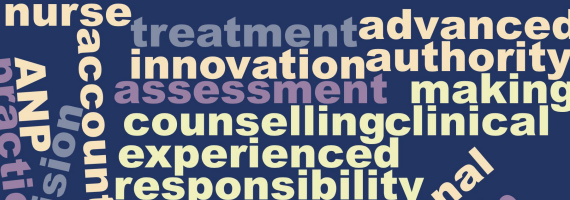Exploring clinical roles
Exploring roles within the clinical practice arm of nursing
Clinical practice offers the widest and most varied range of nursing roles, placing an emphasis on providing direct patient care.
Opportunities and choices are numerous, often leading to careers within specialist or advanced practice.
Considering a clinical role?
The majority of nursing roles fall within the category of clinical practice, characterised by delivering direct care to patients, clients or service users, and boasting the widest choice of roles at a variety of different settings and levels.
In terms of career progression, most individuals will gain a few years post-qualifying experience before going on to senior, specialist or advanced roles.
Moving sideways
It's not all about “moving up the ranks," and you may want to explore a sideways or lateral move. This could be to change setting, gain experience in a different clinical area, enjoy new challenges, work with a different client group, or facilitate a lifestyle choice.
A sideways move may act as a stepping stone if and when you do want to progress upwards.
Consider a senior role if you...
- Often have colleagues asking you for advice or find yourself supporting others more often.
- Feel ready to take on more responsibility.
If you’ve been working at band 5 level or equivalent, but feel you’d like more responsibility or autonomy, you may want to consider a senior nursing role.
Senior nursing roles are usually characterised by working at a higher and more autonomous level, utilising enhanced skills and competencies, and often dealing with more complex patients or cases. Providing clinical leadership and/or mentoring/teaching often form a key part of these roles.
Senior nursing roles usually sit at a minimum of band 6 and may require a few years’ worth of post-registration experience.
Senior nursing roles can act as a great stepping stone, leading to roles in advanced or specialist practice, teaching, research or leadership roles.
Examples of senior clinical roles
- Senior Staff Nurse
- Lead Nurse
- Team leader
- Junior Sister
- Discharge Nurse
- Practice Nurse
- Scrub Nurse
- District Nurse
- Triage nurse
- Nurse adviser
- Senior midwife / Lead midwife
If you're interested in senior roles...
- See the RCN career pathways resource for case studies, videos, and information on entry requirements, skills, and experience needed to move on into various senior roles.
- Express an interest in taking on more responsibility, (e.g. taking charge of shifts, leading on projects, getting more involved in training others or putting yourself forward for training)
- Build up a network of senior nurses by networking at events, meetings, or professional forums, using your colleagues to seek new contacts, reaching out on social media, LinkedIn, etc.
- Shadow senior nurses within your organisation to gain insight into the role and build your contacts.
- Contact other departments, employers or organisations to arrange informal visits or shadowing opportunities.
- Explore and examine vacancies at your target level (e.g. band 6 or band 7) to get a better picture of the type of experience or skills, or knowledge employers are looking for.
- Speak to your employer for support, and make sure any goals or aspirations are documented in your 121s and appraisals.
- See if your employer offers mentoring schemes, internal coaches, or recognised career frameworks.
- Contact your RCN Learning Rep if you have one in your workplace.
Consider a specialist role if you...
- Are interested in working within a particular clinical field or specialism.
- Like the idea of being an "expert" for this field or type of care.
Many nurses are drawn towards specialist roles because they have a particular interest or passion within a certain area of nursing, and prefer the idea of being a clinical expert within that area. You could specialise:
- Within a clinical remit or area (e.g. school nursing, occupational health, sexual health, etc.), or
- In relation to a clinical condition (e.g. substance misuse, dementia, lung cancer, diabetes, etc.)
Nurses working within specialist roles will have specialist skills, competencies and experience, and practice at an advanced level. They will also usually have completed or will be working towards post-registration qualifications relevant to their specialist area such as modules towards a degree pathway, SCPHN courses, or Masters programme. Although they work within a multidisciplinary team, they have a greater deal of autonomy, and will be responsible for a caseload or group of patients.
Some examples of specialist roles:
- Occupational Health Nurse
- School Nurse
- Health Visitor
- Public Health Nurse
- District Nurse
- Clinical Nurse Specialist / Nurse Specialist / Specialist Nurse
- Specialist Mental Health Therapist
- Specialist Midwife
If you're interested in specialist roles...
- Take it upon yourself to become an expert in your chosen field by reading journals, articles, books, attending conferences, joining professional networks, RCN forums, etc.
- Seek opportunities to get involved with initiatives, pilots or projects related to your target field.
- Volunteer to become the "link nurse" for your chosen subject within your unit. (e.g. infection control, diabetes, nutrition, tissue viability, etc.)
- Contact relevant departments, employers or organisations to arrange informal visits.
- Ask to shadow specialist nurses.
- Join the RCN Advanced Nurse Practitioner forum and the RCN Advanced Nurse Practitioner facebook group to speak and connect with other specialist nurses.
- Use your contacts, colleagues, and friends to get in touch with specialist nurses and build up a list of contacts.
- Try and network with specialist nurses or with employers, organisations or charities who employ or engage with specialist nurses
- Volunteer with a charity relevant to your chosen specialty for experience and to gain contacts.
- Speak to your manager for support, and make sure any goals or aspirations are documented in your 121s and appraisals.
- See if your employer offers mentoring schemes, internal coaches, or recognised career frameworks.
- Speak to your RCN Learning rep if you have one in your workplace.
RCN Nursing Career Resource
For more information about the desired qualifications, education, skills, and experience needed to transition into specialist practice, see the RCN's Nursing Career Resource, which includes videos, case studies and loads of further resources.
Consider an advanced role if you...
- Would like more freedom to act and/or make decisions.
- Would like to gain advanced clinical skills or competencies.
If the idea of developing and using advanced skills, dealing with more complex patients and having more freedom to act appeals to you, you may want to consider an advanced nursing role.
Such roles are characterised by advanced clinical skills and competences, a higher degree of autonomous decision-making, along with the remit to diagnose, treat and prescribe. They require an education to Master’s level, as well as prescribing qualifications. 3 years post registration experience is often required.
Nurses in advanced roles practice across primary, secondary and tertiary care, from general practice, to emergency care, to specialties like paediatrics, neonatal care, cancer care, ophthalmology and orthopaedics.
Examples of Advanced roles:
- Advanced Nurse Practitioner
- Emergency Nurse Practitioner
- Nurse consultant
- Specialist midwife
- Consultant midwife
If you're interested in advanced roles...
If you think you might be suited to an advanced role, you'll probably want to do some further research before you start applying. Here's some things you can do:
- Keep your eye out for “trainee advanced nurse practitioner” vacancies. (You may want to contact your local NHS trust or health board for info)
- Shadow nurses in advanced roles. This could be through your networking, informal visits or through your current employer.
- Enquire with universities about any programmes they are running in Advanced Clinical Practice and career prospects
- Contact relevant employers and organisations to arrange informal visits. Be specific about which roles interest you.
- Use your contacts, colleagues, etc. to get in touch with advanced nurses.
- Do your research and examine job vacancies for your target role or level to determine what experience or skills employers prefer.
- Speak to your manager for support, and make sure any goals or aspirations are documented in your 121s and appraisals
- Check if your employer offers mentoring or coaching, or has any career frameworks.
- Check if your employer has an education lead, practice facilitator, or if there is an RCN Learning rep in your workplace.
- Join the RCN's Advanced Nurse Practitioner forum and the RCN Advanced Nurse Practitioner facebook group.
RCN Nursing Career Resource
For more information about the desired qualifications, education, skills and experience needed to transition into advanced practice, see the RCN's Nursing Career Resource, which includes videos, case studies and loads of further resources.

Nursing careers resource
Find out about different roles or pathways within Nursing, developed by the RCN and Health Education England (HEE).

ANP Subject guide

Career progression tips

Research & innovation roles
- Would you like to use knowledge and innovation to transform care?
- Have you got strong verbal and written communication skills?
- Would you like to improve patient care or patient experience?
- Do you have good organisational skills with an eye for detail?
- Do enjoy working with data and technology?

Education roles
- Do you enjoy coaching or mentoring?
- Do you like the idea of supporting and developing others?
- Are you passionate about education and learning?
- Would you mind having less direct contact with patients?

Leadership roles
- Are you good at making decisions and planning?
- Do you often find yourself taking charge or leading in situations?
- Do you enjoy supporting and motivating colleagues?
- Do you consider yourself a good role model?
- Do you mind having less direct contact with patients?

Work-life balance
- Is having a work-life balance a top priority for you?
- Do you need to put yourself or your family before your career?
- Is having a job with flexibility or core hours a priority for you?
- Or do you need to put your mental/physical health first?
More careers resources for nurses
Want to know more?
We offer an online credentialing service






